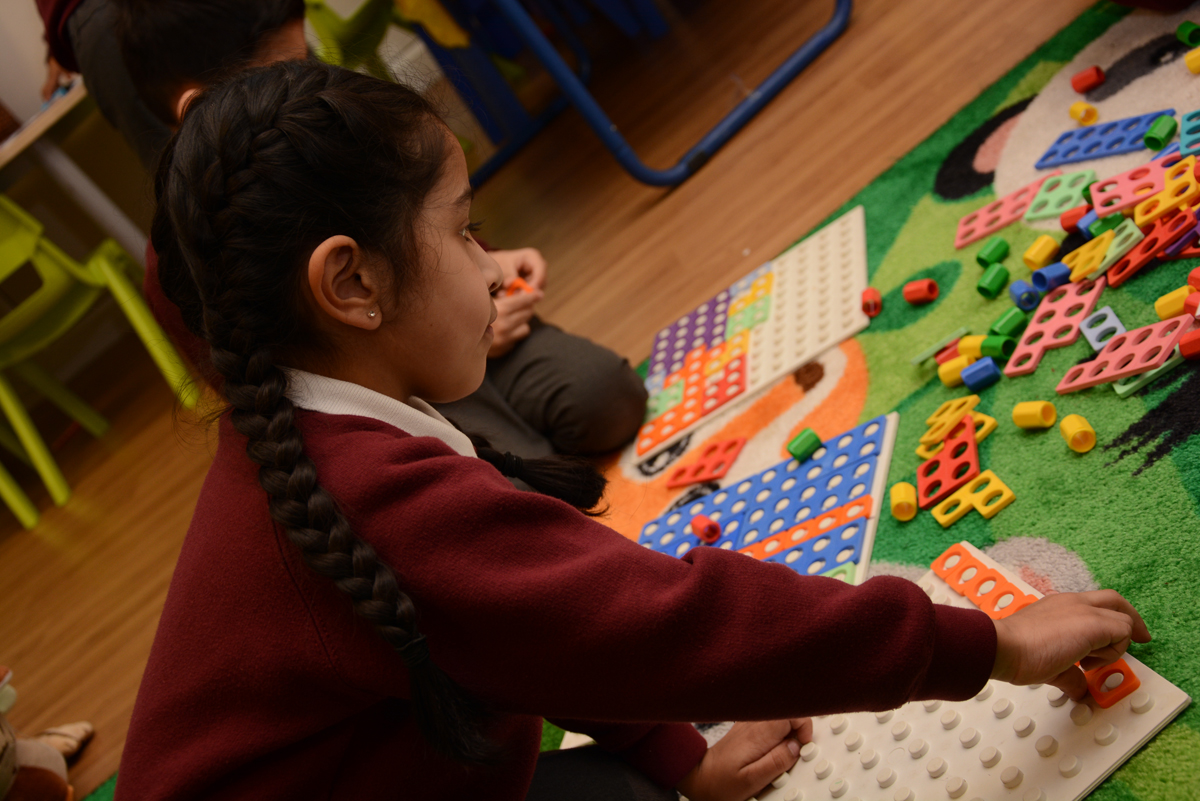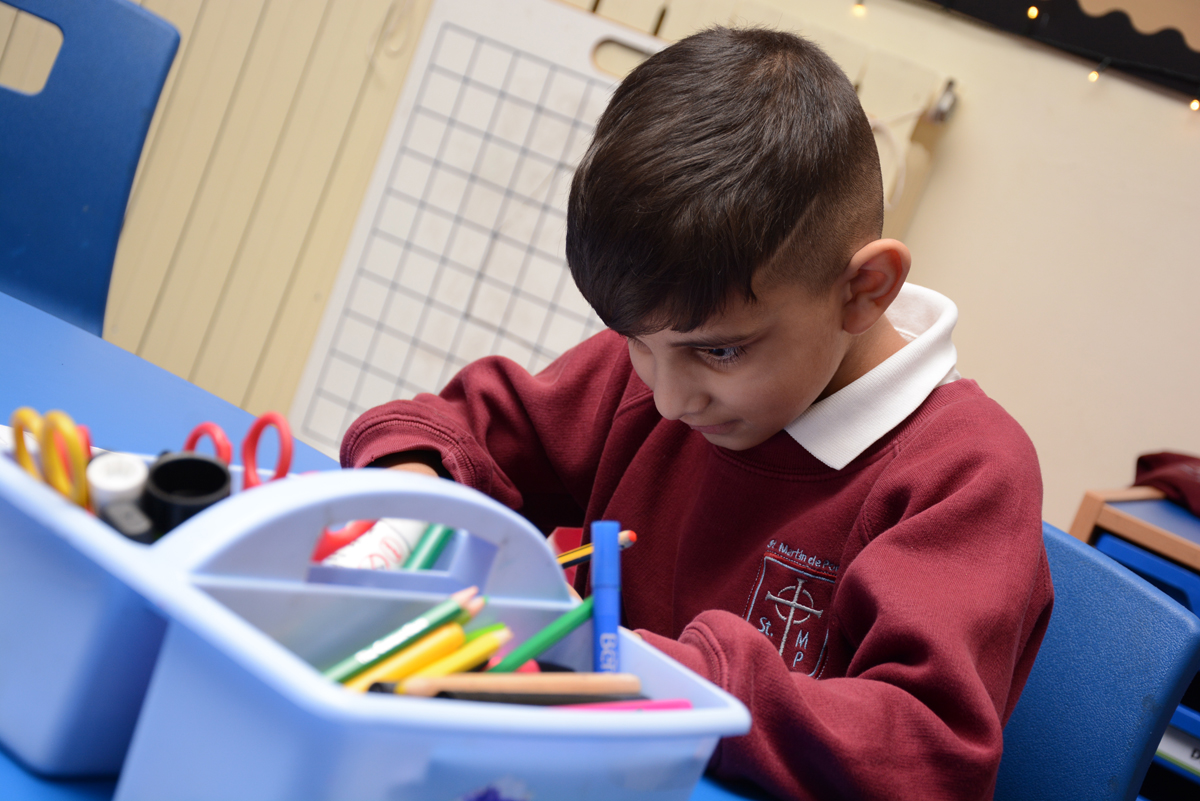Mathematics
Intent
St Martin de Porres Catholic Primary School is aware that mathematics is vital to every child’s life both in and outside of the classroom. Mathematics feeds into many areas of the curriculum and links to many non-school based events too. We want our children to be able to use their mathematic knowledge and skills in a variety of different ways to help them at school and at home. We aim to provide a broad, high-quality curriculum that produces confident and capable children, who can use different aspects in mathematics in different ways.
We aim to ensure that all children are:
- Fluent in the fundamentals of mathematics so they develop a conceptual understanding;
- Can use mathematical reasoning and develop use of mathematical reasoning;
- Can solve a variety of problems by applying their mathematical knowledge confidently.
It is our intent to provide children with a high-quality, broad and challenging mathematics curriculum with the development of children’s ‘mathematics sense’ and enjoyment at the heart of each mathematics lesson. We believe that all pupils can succeed in mathematics. A positive teacher mind-set and strong subject knowledge are key to student success in mathematics. By building confidence, resilience and a passion for mathematics, we can show that whatever your prior experience or preconceptions, mathematics is an exciting adventure that everyone can enjoy, value and master.
Implementation
We use the White Rose Schemes of Learning to guide our teaching of mathematics from Reception to Year 6. White Rose is based on the mastery approach. Each mathematics lesson follows an episodic teaching sequence where each ‘mini episode’ within a lesson builds towards mastery and understanding of a small mathematical step. To learn mathematics effectively, some things have to be learned before others, e.g. place value needs to be understood before working with addition and subtraction, addition needs to be learned before looking at multiplication (as a model of repeated addition).
 Every unit of work begins with an assessment paper, which is analysed by the class teacher. The class teacher then uses the analysis to plan high-quality, impactful lessons based on what the class and (sometimes) individual children need. All children work on the same lesson objective unless they are unable to due to complex SEN needs. Pupils, who rapidly grasp concepts, are given rich, broad and sophisticated tasks to deeper problems to build a more profound understanding.
Every unit of work begins with an assessment paper, which is analysed by the class teacher. The class teacher then uses the analysis to plan high-quality, impactful lessons based on what the class and (sometimes) individual children need. All children work on the same lesson objective unless they are unable to due to complex SEN needs. Pupils, who rapidly grasp concepts, are given rich, broad and sophisticated tasks to deeper problems to build a more profound understanding.
It is through following a mastery approach and progressively developing the knowledge and skills needed to both meet and exceed the expectations set out in the national curriculum programmes of study that our children will acquire deep, long term, adaptable and secure understanding of mathematical concepts.
We see mastery as three dimensions: conceptual understanding, mathematical thinking and language and communication. These are the key ‘ingredients’ to ensure that we provide children with the knowledge and skills that enable them to access the curriculum in full building competent and confident mathematicians.
- Conceptual understanding – Mathematics tasks are about constructing meaning and making sense of relationships. Children deepen their understanding by representing concepts using objects, pictures, symbols and words (concrete, pictorial and abstract - CPA) ·
- Mathematical thinking – Children develop mathematical ‘habits of mind’ – to be systematic, generalise and seek out patterns. They think mathematically and are given tasks that require them to specialise and generalise, to work systematically, to generate their own examples, to classify and to make conjectures.
- Communication and language – Mathematical language strengthens conceptual understanding by enabling pupils to explain and reason. The more learners use mathematical words the more they feel themselves to be mathematicians. Talk is an essential element of every lesson and time is dedicated to developing confidence with specific vocabulary as well as verbal reasoning.
Secure Foundations
To secure firm foundations in the development of good number sense for all children from Reception through to Year 1 and Year 2 we follow the National Centre for Excellence in the Teaching of Mathematics (NCETM) Programme called: Mastering Number at Reception and KS1.
This programme focuses on the key knowledge and understanding needed in Reception classes, and progression through KS1. In Reception class, this programme is the main maths lesson for all number work, and we ensure that children are offered opportunities within the wider provision to embed their learning, including by using ideas suggested in the materials. In Year 1 and Year 2 we use the Mastering Number materials in addition to their daily maths lesson an overview of the programme is shown below.
Curriculum Overviews
White Rose Schemes of Learning:
- Year 1 Mathematics Curriculum Overview
- Year 2 Mathematics Curriculum Overview
- Year 3 Mathematics Curriculum Overview
- Year 4 Mathematics Curriculum Overview
- Year 5 Mathematics Curriculum Overview
- Year 6 Mathematics Curriculum Overview
NCETM Mastering Number at Reception & Key Stage 1 Programme Overviews:
- NCETM Reception Mastering Number Overview
- NCETM Year 1 Mastering Number Overview
- NCETM Year 2 Mastering Number Overview
Impact
Through a well-sequenced curriculum that allows the children to build upon prior learning and the reinforcement and repetition of knowledge and skills. Our aim for all children is to achieve age related expectations at the end of each year group. Although, perhaps most importantly, we recognise the impact that creating children, who are curious and competent mathematicians will produce life-long mathematical thinkers who will have the knowledge and skills required to achieve our core aim of preparing children to make positive contributions to the community we serve. It is truly our aim to foster and develop a love of mathematics. It is though this love of mathematics that children will embrace challenge and develop resilience, confidence and a positive attitude towards the subject. The skills developed within our curriculum are interchangeable life skills, which will prepare our children as they learn and grow.
of knowledge and skills. Our aim for all children is to achieve age related expectations at the end of each year group. Although, perhaps most importantly, we recognise the impact that creating children, who are curious and competent mathematicians will produce life-long mathematical thinkers who will have the knowledge and skills required to achieve our core aim of preparing children to make positive contributions to the community we serve. It is truly our aim to foster and develop a love of mathematics. It is though this love of mathematics that children will embrace challenge and develop resilience, confidence and a positive attitude towards the subject. The skills developed within our curriculum are interchangeable life skills, which will prepare our children as they learn and grow.
 St Martin de Porres
St Martin de Porres 


